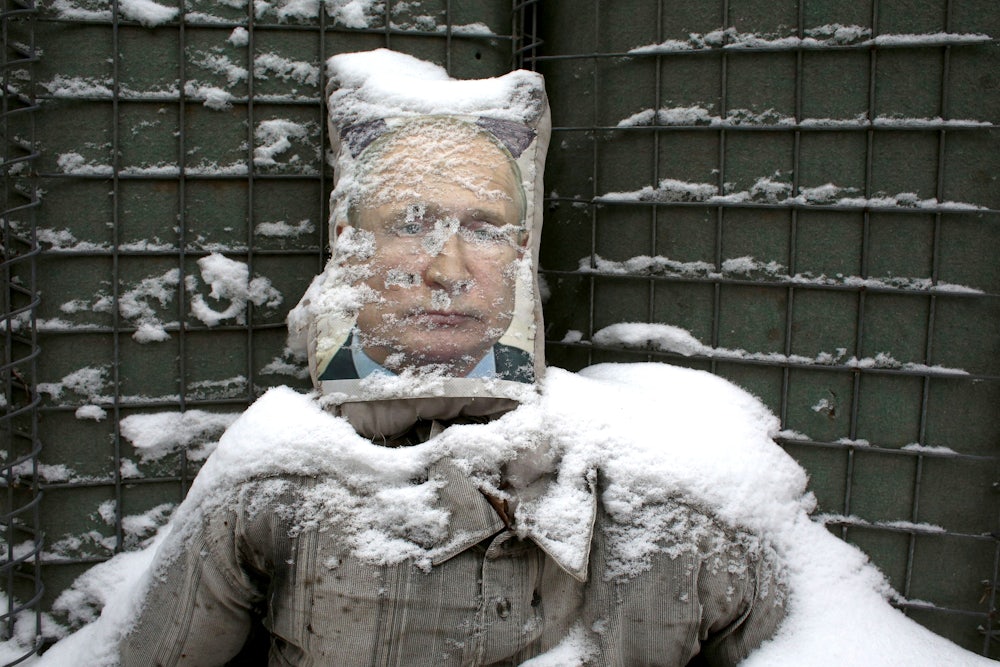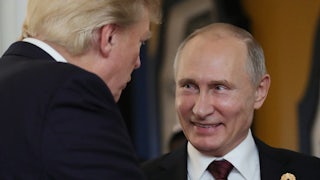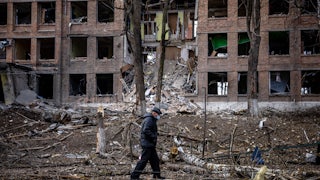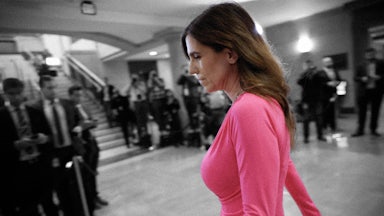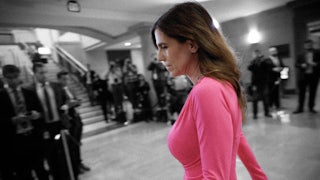Joe Biden was confident. “This, in fact, is the beginning of another 50 years of peace,” he declared while serving as ranking member on the Senate Foreign Relations Committee in 1998. The Delaware Democrat was proud of his role in helping the bipartisan congressional vote to approve the addition of Poland, Hungary, and the Czech Republic as full NATO members.
Not everyone was so optimistic, however. One month earlier, during a Senate debate, New York Democrat Daniel Patrick Moynihan cautioned, “We’re walking into ethnic historical enmities.” He added: “We have no idea what we’re getting into.”
Hearing Moynihan, Biden’s face reddened. He stalked the Senate floor for 10 minutes, waving his arms and shouting. “I find this absolutely astounding!” he said. “If my friends are saying, anyone who votes for expanding NATO to include Poland, the Czech Republic, and Hungary, are tying this noose around a Russian neck, this iron ring, well, then I don’t quite get it.”
Now that Russia has invaded Ukraine, Biden likely finds Moynihan’s predictions less astounding. Throughout the 1990s and early twenty-first century, critics like Moynihan warned that U.S. decisions were provoking and humiliating a weakened but still powerful country. The end result of an invasion of Ukraine was not inevitable. Make no mistake, the moral culpability for this crisis is wholly upon Russian leader Vladimir Putin, whose unique brutality, nostalgia for a lost empire, and desire to snuff out Ukrainian democracy led to this exact moment. But, as with the Iraq War, a long but already-forgotten list of critics warned that the United States was helping to create the sort of awful predicament we find ourselves in: facing an aggressive Russia increasingly detached from Europe and international law. Why didn’t we listen?
The final years of the Soviet Union, and the first years after its demise, brought great promise and high expectations. Liberation from totalitarian rule, independence for Eastern European nations, and a chance for Russia to join the club of liberal democracies. But the era was also traumatic for Russians, and not just because they lost great-power status. Economic catastrophe and political chaos were widespread for several devastating years. Under U.S. guidance, leaders sold off state assets at bargain prices to crooked officials and businesspeople, weakening the rule of law and a national sense of solidarity while doing little to revive the faltering economy. “Corruption and insider dealing were rampant,” an American economist who advised Russia during this period later lamented.
As the 1990s progressed, there was a clear desire for security. “Many, who had watched indifferently or with sympathy how the old Soviet state had been dismantled, now wanted to build a strong Russian state, as a guarantor of economic and social stability,” writes the historian Vladislav Zubok, in his new book, Collapse: The Fall of the Soviet Union. Putin has succeeded in being this guarantor, but at the cost of the liberties and human rights of Russians. Given the corrupt authoritarianism of Russian elites and cruelty of Putin, could the United States really have done anything to affect this outcome? Perhaps not.
But the ways in which historians, diplomats, and political scientists foresaw the current crisis make their Cassandra-like prophecies important to consider. As the Clinton administration signaled its wish to expand NATO, Charles Kupchan penned a New York Times op-ed in 1994 forecasting: “An expanded NATO would lead Russia to reassert control over its former republics and to remilitarize.” Kupchan, who had served as director for European affairs on Clinton’s National Security Council, said that bringing new countries into the alliance would not protect them from Russia, since Moscow didn’t threaten them. But, he added, Western leaders would create a self-fulfilling prophecy by inflaming Russian nationalism if they pursued NATO expansion.
The next year, Johns Hopkins University political scientist Michael Mandelbaum suggested that by ignoring the question of Ukraine’s position in the alliance, NATO expansion would neither unite Europe nor protect the single country most vulnerable to Russian aggression. “It is not an exaggeration to say that NATO expansion will be good or bad depending on its effect on the peaceful coexistence of Ukraine and Russia,” he wrote.
Soon, more than 15 distinguished Cold War–era diplomats signed an open letter in The New York Review of Books arguing that NATO expansion would be disastrous. They were bolstered in February 1997 by George Kennan, the legendary ambassador to the Soviet Union and Cold War theoretician. He wrote bluntly that NATO expansion was a historic error, one that might “restore the atmosphere of the cold war to East-West relations, and ... impel Russian foreign policy in directions decidedly not to our liking.” Inside the Clinton administration itself, Defense Secretary William Perry nearly resigned when his advice against rapid NATO expansion went unheeded.
Of course, Clinton ignored these critics, as did George W. Bush’s administration when it oversaw another round of NATO expansion in 2004. There was strategic and moral logic for their decisions, and NATO expansion solved the problem of how to integrate some Eastern European countries into the Western fold. “The big question most people who opposed NATO enlargement don’t address is what would their alternative policy have been,” said James Goldgeier, an American University political scientist who wrote a book on NATO enlargement. Perhaps Russia would have invaded the Baltic states were they not NATO members, he suggested.
The 2008 NATO Summit in Bucharest, Romania, proved more fateful than previous rounds of expansion, however. The organization declared that Ukraine and Georgia would eventually become members, over Russia’s threats of retaliation. “I think that was a huge mistake; it was hugely provocative,” said Goldgeier. A few months later, the Russian-Georgian War erupted. The Rand Corporation’s Samuel Charap said that the actions the West took in 1999 and 2004 were fundamentally different than NATO’s 2008 choice to promise eventual membership to Ukraine.
Even after the bloody Russian-Georgian conflict, however, Russia and NATO still were civil. “They had a functional relationship; they actually have areas of cooperation on things like anti-piracy and even theater missile defense, counterterrorism, training police for Afghanistan,” recalled Charap, who served in the State Department and is the co-author of Everyone Loses: The Ukraine Crisis and the Ruinous Contest for Post-Soviet Eurasia.
But the 2014 revolution in Ukraine was transformative. The Obama administration, along with Republican senators like John McCain, blatantly supported the pro-Western, anti-Russian forces in Ukraine. When the pro-Russian president was removed and fled the country after months of protests, Putin saw an urgent threat and annexed the Crimean Peninsula from Ukraine. “Ukraine, for very deep historical, cultural, national, strategic economic reasons was a completely different kettle of fish,” said Anatol Lieven, an expert on Russia at the Quincy Institute for Responsible Statecraft. Russian elites have been saying that for 30 years, and capitalizing on those sentiments is catnip for an authoritarian populist like Putin.
With Russia now trying to devastate Ukraine’s sovereignty and liberalism, the once-powerful visions of a Europe united whole are ruined. Instead, some of the same analysts who warned about the deteriorating U.S.-Russia relationship are raising the alarm again. “What we’re looking at here is Cold War 2.0 and the remilitarization of the border between NATO and Russia,” Charles Kupchan said on February 28. Michael Mandelbaum is equally pessimistic, observing how China and Russia are increasingly cooperating at the expense of the West even beyond the war in Ukraine. He is blunt about the failures of the United States in the post–Cold War world. “From [NATO] expansion,” he wrote in January, “the Russians drew some lessons that it was not remotely in the American interest for them to learn: namely, that it was vital to build up their military power, and that trust in and cooperation with the United States are foolish, if not dangerous.”
One day, Putin will depart the scene, Mandelbaum continued, and Western leaders will have another opportunity to shape relations with Russia. When they do, they should remember the dictum that Winston Churchill fashioned when he faced a weakened former enemy: in victory, magnanimity.
